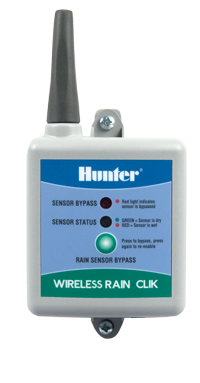Setting the Transmitter Address at the Receiver
Each transmitter is produced with a unique address, a receiver must learn this address to work with that transmitter. This step is only necessary if transmitter and receivers are purchased seperately or if a power outage has caused loss of communication.
| 1. Prior to applying power (yellow wires) to the receiver, press and hold the bypass button on the receiver. |
| 2. While the bypass button is depressed, apply power to the receiver. The sensor status indicator light should light up yellow indicating that the receiver is ready to learn a new address. |
| 3. Press and hold the Quick Response button on the transmitter. |
| 4. Within 4 seconds, the receiver's sensor status light should turn red. The receiver has now learned the address and it should be retained even in the event of a power outage. |
| 5. Release the button on the transmitter. The sensor status indicator light should turn green. |
Battery Life
The Wireless Rain Clik transmitter is designed to operate up to ten years with it's sealed, maintenance free battery. Should you need to change the transmitter, the receiver will have to learn the new transmitter address. To check the status of the battery in the transmitter:
- Press and hold the quick response test spindle on the top of the sensor.
- Within a few seconds the LED light on the bottom of the sensor will briefly flash.
- Release the spindle and the LED will flash again. If the LED flashes, the battery is the transmitter is good.
Note: This test can only be performed when the sensor is dry.
Still need help? We're here.
Tell us what you need support with and we'll find the best solution for you.




